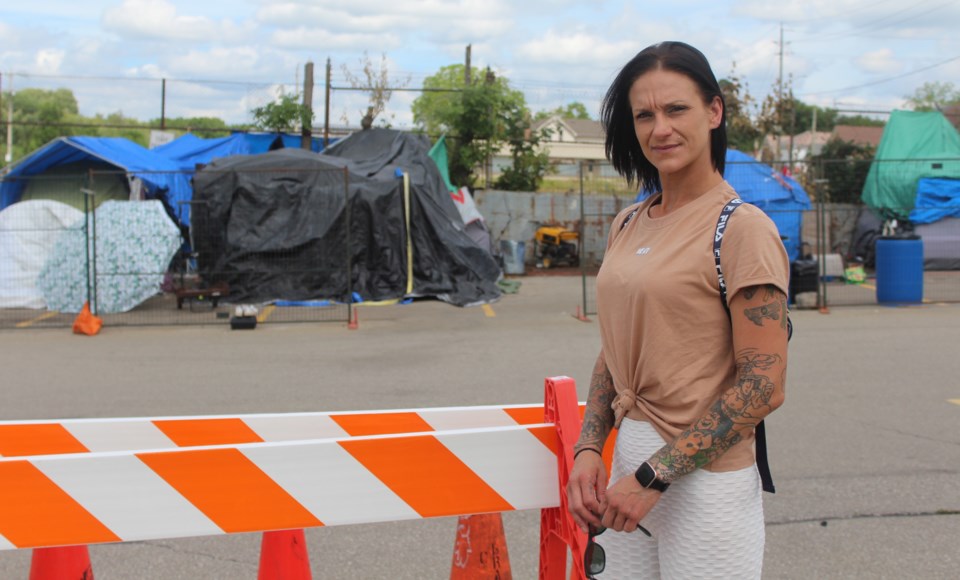As Amanda Speed walks into the parking lot at 150 Main St. in Galt, she greets those puttering around outside their tents.
The residents used to be her neighbours when she had her 17-foot trailer parked up against the vacant lot next door that will soon be home to a new condo complex.
But more importantly, they remain her friends.
“You’re safe here,” Speed turned and said.
“It’s not what people think.”
There’s arguably been no hotter button topic in the city over the past year than the comings and goings of the encampment.
A Facebook group titled “Neighbourhood Watch Cambridge, Ontario” has documented many of the homelessness issues that are plaguing not only the people experiencing it, but the broader community who’s growing ever frustrated by the lack of security around the core.
A 25-year resident of the neighbourhood told CambridgeToday back in June that he no longer feels safe in his home.
“Since this encampment opened up about a year ago I've had a home invasion,” he said.
“This guy came into my house and started looking through all my stuff and scoping it out. After I asked him what he was doing, he ran and by the time I got outside he was gone. I don't go outside much. I don't want to go outside."
But even some of those issues aren’t always what they seem when they’re pinned on those living in the parking lot behind the social services building, Speed says.
“The second day I came here, I was plastered all over the Facebook group as someone who now lives in a camper on the property,” she said.
“They thought it was a joke. Do you know how many people drive by here every single day gawking? People apparently call it the Cambridge zoo. When they see the bins out here they yell things like ‘you belong in the trash.’”
Heightened safety measures have been taken in an attempt to ease the tension. Construction style barricades and pylons block off the parking lot at night to limit entry and extra security has been put in place.
When reached for comment, the region, which owns the land the encampment is on, confirmed access to the parking lot was restricted overnight.
Fencing was initially erected around the tents back in September and Speed says as recently as a couple months ago a car drove into it, prompting more to be done.
“It doesn’t make them feel any safer,” she said of the barricades.
“The problem is people come here and get high that don’t live here. They destroy the place and that’s what the neighbourhood sees and records. That’s the issue, that’s what’s making these people look bad. The residents aren’t the problem.”
Speed isn’t oblivious to what’s going on and says she totally understands the frustration of nearby residents. As a mother herself who works, she gets it.
“I completely understand,” she said.
“But if they were to actually pay attention, security really needs to buckle down when they see someone bugging out and remove them if they’re not a resident.”
Speed’s frustration comes from people forming opinions based only on what’s being recorded and believes there’s a misunderstanding of what’s actually going on.
“Some of the people here are the most generous people because they know what it’s like to have nothing,” she said.
“They’re portrayed as crazy drug addicts but they’re decent human beings if you have a conversation with them.”
The fix according to Speed is more resources in the downtown core, not less. Many of the residents are reluctant to the idea of accepting offers to move to a sanctioned encampment like the one at Erb Street in Waterloo because Cambridge is all they've ever known, she says.
Access to critical resources played a huge part in her own successful journey to sobriety and believes it could for others, as well.
“The solution is to put money into developing housing and rehabilitation sober living,” she said.
“When I got clean back in 2007 all the resources were right here, from counselling to relapse prevention. All the people I used to use with, 90 per cent of them are sober now. People don’t want to live like this.”
To address the issues and gain a better understanding, the city hosted a community safety town hall last month to give people a chance to express their concerns to Mayor Jan Liggett and council, a meeting Speed not only attended but spoke at.
A second meeting that will include regional and police representatives is planned for Sept. 18 at city hall.
How productive they are remains to be seen. Speed intends to go to the follow up meeting but isn’t hopeful.
“They’re a show,” she said.
“What gets solved? What gets done? What gets listened to? ”



